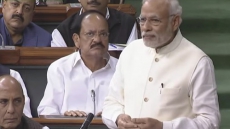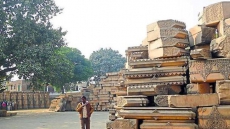External Affairs Minister S Jaishankar said the Kashmir issue should not be seen through a communal lens as the Jamiat-Ulema-e-Hind, one of the leading Islamic organisations in India, had backed the changes there, and the fact that India's relations with the Muslim nations of the Gulf have seen an upward trajectory in the past five years negates the idea that the government is anti-Muslim.
Speaking at the Council on Foreign Relations, Jaishankar, to a question on the "rise of politicised Hindu nationalism" in India, said he did not agree with the analysis of the questioner.
"I would put it differently. What we have seen after 70 years of independence is the result of the democratisation of India. Today political power, social power and to some extent economic power has shifted out of the big cities, the more cosmopolitan cities, where people speak English and have a global comfort level, and moved to a different set of people; to those who are comfortable speaking in their own languages, to a milieu far more rooted on the ground."
He said the changes in India "actually demonstrate the successes of democracy, and what it has meant in terms of consequences on the ground".
He said he does not accept the view that secularism is under threat in India.
"At the end of day, secularism was not promoted by a law or by a constitutional belief, it was promoted by the ethos of the society. If the ethos of a society was not secular, no law, or constitutional provision would have ensured it. I don't think the ethos of our society has changed, and the ethos of India, the Hindu ethos, is very secular."
To another question that there is a "deep perception of Hindu nationalism" in the country, and a view that Prime Minister Narendra Modi is "nationalistic and anti-Muslim", Jaishankar debunked the view.
He said the Jamaiat-Ulema-e-Hind, a "national organisation of great influence and weight in Indian, at their annual meeting, have spoken out very clearly in favour of changes in Kashmir. I would not agree that the Kashmir issue should be seen through a communal lens".
He was referring to the allegations of Pakistan that India is out to change the demography of Kashmir from a Muslim majority one to a Hindu majority, under what Imran Khan calls a "fascist, Hindu supremacist" government led by Modi.
"If you look today at changes in India, probably the word that captures it best is, India is modernising, in a very interesting way. And it's not necessarily state driven. Anything the state does is overshadowed by what the smartphone does. The moment people have money, when I had money the first thing I dreamt was having a car. Today someone who is 16, 17,18 wold think of getting a phone and improving the phone.
"Today we are seeing a more urbanising society, a society that is more meritocratic, the social gains are spreading, but at the same time, there is more internal mobility, which was not there before. I would predict that you would have a society where increasingly traditional identities matter less than they did in the past."
Jaishankar also said: "In terms of how to approach the Indian state of the ruling political party.. today if there is one area of where we can boast of visibly good relations in the last five years is the Gulf, and you know the dominant faith in the Gulf.
"I think they (Gulf nations) see it, there is an objectivity about them, they don't have vested interests in what is essentially an Indian domestic discourse.
"I would not be comfortable with the view that we are headed for some kind of a collision with the Muslim community globally. That is not the case."

